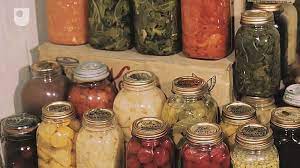Because of the current fast pace of life, the most important thing in the process of food preservation is high efficiency. In addition, it plays a role in reducing food waste, minimizing the use of packaging materials, as well as facilitating people’s self-help in some accidents or war disasters when entering the post-nuclear stage. Various methods have been used for food preservation in our daily lives, for example, food-preserving cans, vacuum packs and so on. However we would like to emphasize food wraps in this article. Food wraps are made from various plastics as the materials and used by people in their day to day lives.
Understanding Food Preservation
Food preservation aims at treating and handling food to halt or significantly delay the spoilage of food caused by microorganisms or other damage such as heat, moisture and light. These approaches have been known since the early civilisations including canning, freezing and drying. In daily life, especially in home kitchen and catering service, refrigeration and food wrapping are more frequently applied.
The Benefits of a Food Wraps
I believe that the main function of a food wrap is to protect the food from various airborne organisms that can contaminate the food items and also from moisture that can lead to degradation of the texture and flavour. Besides, the food wrap stick to perishable items very well to ensure that they retain their freshness for a long time. Finally, I think food wraps can be used for all kinds of food items, from leftovers to green vegetables.
Foodwrap helps people save the food from being wasted by keeping the left overs and unused food away from them and saving it for later use. It supplies a much better method of safekeeping the food than discarding it. This method saves a lot of money in a long run and reduces the environmental burden associated with the food production and waste.
Types of Food Wraps
Varieties of food wraps are commonly available, each for a specific purpose:
There are two types of food wraps commonly available, each dedicated to different needs and preferences.
Plastic Wraps: The ubiquitous favourite, clinginess and a great, portable seal, making them the perfect choice to help combat waste and consolidate life. However, the trend toward reducing plastic waste and ‘chemical leaching’ has many consumers searching for something different.
Aluminium foil: Used to wrap food to cook in the oven or to reheat in the microwave, however aluminium foil (known as tin foil in some countries) is also fairly easy to recycle, which makes it a more ecologically minded alternative.
Beeswax Wraps. Photo courtesy Meghan McCarty Carino/Creative CommonsMeet beeswax wraps, the environmentally friendly substitute for other synthetic wraps. They’re made from cloth coated in beeswax, and they’re reusable and compostable – they soften in your hand and form a seal around food or around the rim of a container.
Silicone Wraps: The perfect sustainable replacement to single-use plastic because it is washable and flexible, silicone wraps make for an easy transition to a plastic-free life – plus they will save you money over time.
Challenges in Food Preservation
While food wraps are a good solution, disposable wraps create their own problems. For example, the environmental impact of disposable food wraps is why many people prefer a reusable food wrap. Secondarily, reusable wraps require some training to use on all types of food, and the improper use of these wraps can cause spoilage and waste.
Solutions and Sustainable Practices
For all these reasons, it is important to use the right type of wrap to suit the task, focus consumer education on how to use food wrap more effectively, and embrace more sustainable options. Food wrap offers an exciting canvas for innovation in biodegrad sustainably manage our plastics consumption in the future.
Conclusion
Food products need to be preserved in order to preserve quality, safety and longevity of supplies. And used properly, food wrappings can be an incredibly useful part of preserving foods. Businesses and consumer seeking ecologically friendly options to preserve foods like beeswax and silicone wraps can look to Richmond Advantage to supply them with their high-quality food-preservation supply needs. Organisations looking for a selection of plastic and aluminium options that are the ‘classic’ way to preserve foods can also find suitable supplies with Richmond Advantage. Food preservation can be greatly aided by disposable plastic wrap, and great satisfaction can be had when unwrapping gifts found in sturdy aluminium foil.
In a nutshell, whether at home or in professional kitchens, good food wraps make a difference in how we keep our food looking good and fresh, and help to minimise our food waste.



